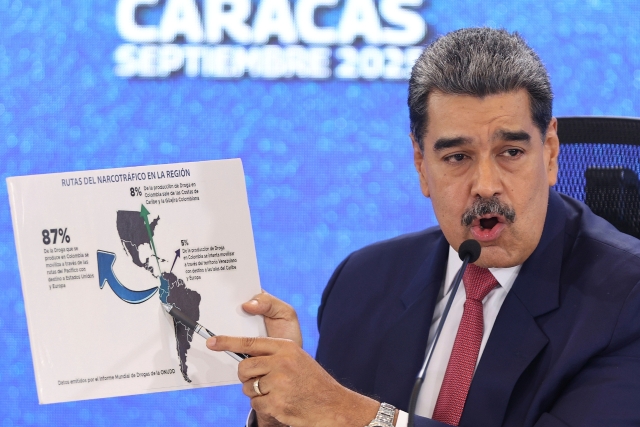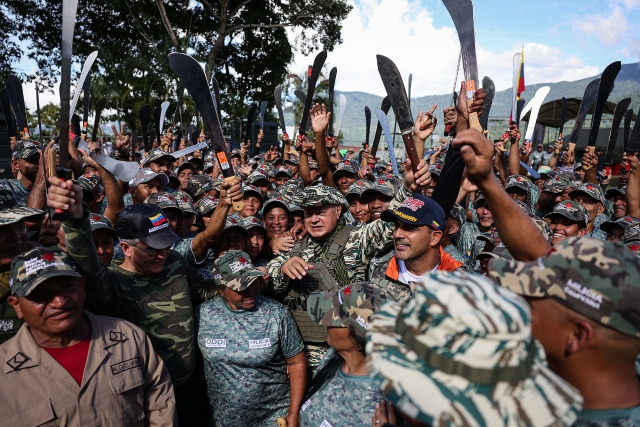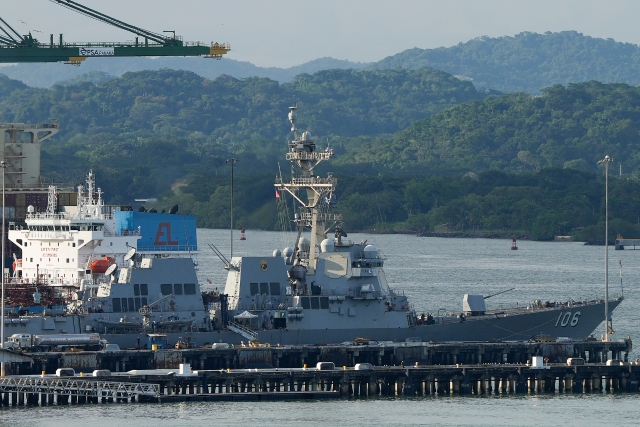In a public admission from the Oval Office, U.S. President Donald Trump confirmed he has authorized the CIA to conduct covert operations inside Venezuela. He cited two primary justifications: that Venezuela had "emptied their prisons into the United States" and that "a lot of drugs come in from Venezuela." This move comes as President Nicolas Maduro publicly refuses what he calls U.S.-backed "regime change," instead appealing for "no to war, yes to peace."
Analysts warn that behind the rhetoric of combating drugs and migration lies a deeper geopolitical objective: control over Venezuela's immense oil reserves. The authorization signals an alarming pivot toward overt intervention. Now, U.S. covert operations in Venezuela are amplifying a shadow of gunboat diplomacy, a modern echo of Washington's controversial history of regime-change operations across Latin America.

Venezuela's President Nicolas Maduro points at a map of the Americas during a news conference in Caracas, Venezuela.
How things escalated
The U.S. has significantly intensified military pressure on Venezuela in recent months. Since September, it has conducted at least five maritime strikes on vessels in international waters near the Venezuelan coast, resulting in 27 fatalities.
These operations are supported by a substantial military presence: approximately 10,000 U.S. troops stationed in the Caribbean, eight warships, a nuclear-powered submarine, and B-52 bombers that have repeatedly flown near Venezuelan airspace. The U.S. has also doubled its bounty on President Maduro to $50 million, accusing him of leading a narcoterrorist network.
In response, Venezuela has activated nationwide defense operations, conducted large-scale military exercises, and mobilized around 4.5 million militia members, including recruiting from indigenous communities—signaling a firm stance of resistance.

Diosdado Cabello, Minister of the Interior and Justice, accompanied by militiamen during a swearing-in ceremony for peasant militias.
Despite the heightened rhetoric and military posturing, most analysts believe a full-scale U.S. invasion remains unlikely. Washington appears to prefer a strategy of coercive pressure—combining sanctions, naval blockades, and covert operations—over direct military engagement. Venezuela's substantial defensive preparations and the risk of regional backlash further reduce the likelihood of large-scale conflict. However, the situation remains volatile. Limited military strikes or CIA-backed subversion remain plausible, sustaining a climate of uncertainty.
What goes beyond the "war on drugs"?
The U.S. justification for intervention—curbing drug trafficking—is not supported by international data. Reports from the UN Office on Drugs and Crime and the U.S. Drug Enforcement Administration do not classify Venezuela as a major drug-producing or transit country. This discrepancy underscores that Washington's real objective is political: regime change, not narcotics enforcement. The CIA's involvement evokes a troubling history of U.S. intervention in the region, from the 1954 coup in Guatemala and the 1961 Bay of Pigs invasion to attempts to assassinate leaders in Cuba and the Dominican Republic.
At the heart of the geopolitical standoff are Venezuela's 300.9 billion barrels of proven oil reserves—the largest in the world. The nationalization of the oil sector under former President Hugo Chávez displaced U.S. corporations such as ExxonMobil and ConocoPhillips, which together lost over $20 billion in assets. Leaked U.S. State Department documents reveal a detailed "oil reconstruction plan" for a post-Maduro Venezuela, modeled on Iraq's post-2003 privatization.

The U.S. Navy's USS Stockdale, an Arleigh Burke-class guided-missile destroyer, docked at the Frigate Captain Noel Antonio Rodriguez Justavino Naval Base, near the entrance to the Panama Canal in Panama City, Panama, on Saturday, Sept. 20, 2025.
The plan would grant Chevron operational control of the state oil company PDVSA and open the sector to private investment. This confirms that U.S. efforts to shift Venezuela's political trajectory are fundamentally driven by energy interests.
Regional and global implications
The U.S.-Venezuela confrontation has triggered significant regional and international repercussions. Several Latin American governments—including those of Bolivia, Colombia, Mexico, and Honduras—have criticized Washington's interventionist approach.
There are even discussions among some South American governments about forming a "South American NATO," which could reshape regional security architecture. Should the U.S. pursue regime change, it risks not only destabilizing Venezuela but also triggering proxy conflicts with major powers, further fragmenting the international order.
The Trump administration's overt use of covert operations and military intimidation against Venezuela transcends the stated war on drugs. It is a clear play for resource dominance, framed in the language of security and rule of law. As in past interventions, the underlying objective—control over oil—remains unstated but unmistakable.
How this crisis evolves will test the resilience of international norms and may redefine the geopolitical balance in a rapidly changing world.
Reporter: Guo Zedong
Photo: CFP
Editor: Guo Zedong, James Campion, Shen He
















